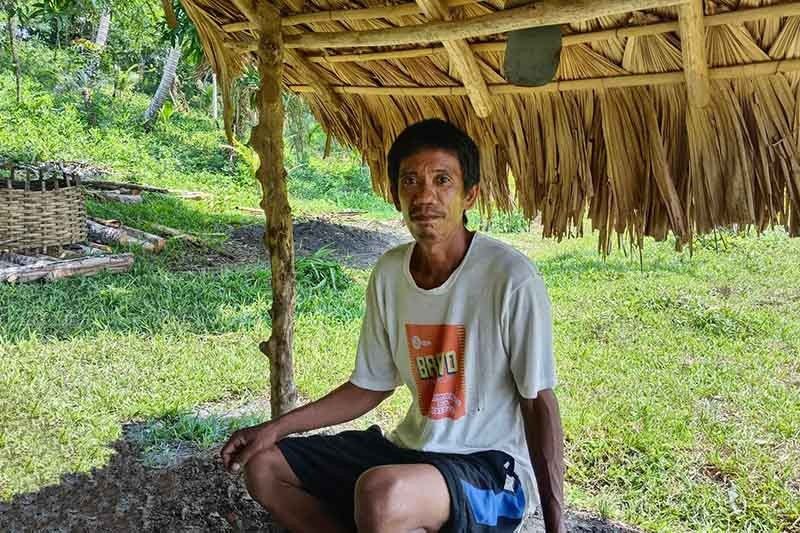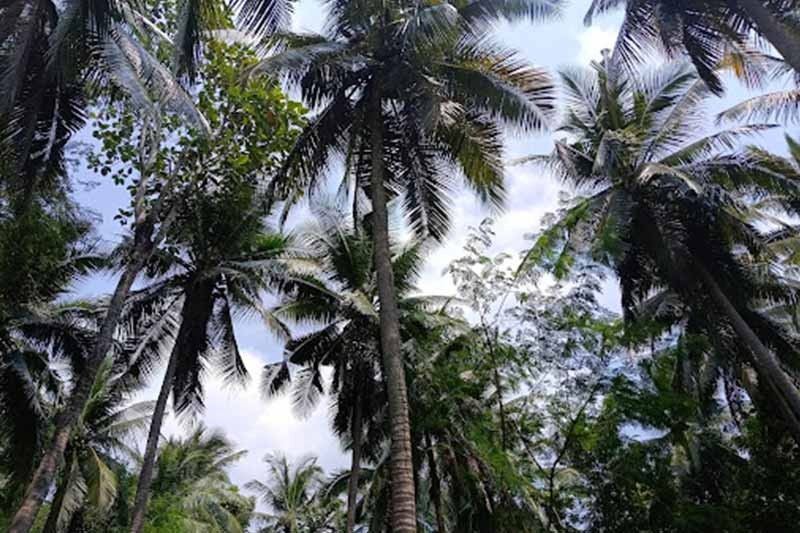Quezon farmers struggle for climate resilient coconut industry

MACALELON, Quezon province — Joselito Batanes, a native of Quezon province, has depended on coconut farming for more than 30 years now.
Batanes tries to make ends meet by maintaining the coconut trees in someone else’s farm located 2.4 kilometers away from the center of Macalelon town with the hopes of harvesting its products at the end of the year.
Quezon province is among the top producers of coconut in the Philippines, accounting for 10% of total supply nationwide. Over 2,151 stakeholders consisting of smallholder farmers, dealers of copra, and traders in the province directly depend on the coconut industry, according to the Southeast Asian Regional Center for Graduate Study and Research Agriculture.
However, for Batanes, working with coconuts is now more challenging due to the frequent strong storms.
"Whenever we are affected by a typhoon, the time we need to recover usually spans from one to two years," Batanes said, adding that the best thing they can do is to hope that bad does not come to worse.
“I simply wish that the loss we incurred is not that big,” he said.
This phenomenon is not peculiar to Batanes' area.
According to the Philippine Atmospheric, Geophysical, and Astronomical Services Association (PAGASA), an average of 20 tropical cyclones visit the country, and eight or nine make landfall.
Last year, the National Disaster Risk Reduction and Management Council (NDRRMC) said that the northern portion of Quezon was the hardest hit among all the provinces battered by Super Typhoon Karding (Noru). Quezon's provincial agriculture office saw P186.5 million in damage to agriculture, and P25.8 million of this belonged to 27,640 hectares of coconut trees, affecting 9,213 coconut farmers.
But Batanes' problem does not solely revolve around intensified typhoons as they are also continuously threatened by the dry spell brought about by the El Niño phenomenon.
"It's also hard when we're experiencing drought because we get less harvest from coconut trees," Batanes said.
In 2019, a report by the same office stated that the El Niño damaged 183 hectares of coconut in Quezon. Last July 2023, PAGASA declared its onset, which could last until the first quarter of 2024.
Dry seasons and typhoons are natural occurrences in the country due to its geographical position. However, climate change exacerbates the effects of El Niño, and it can trigger the generation of stronger typhoons, according to the National Integrated Climate Change Database and Information Exchange System.
Agriculture, as one of the country’s major industries, bears the brunt of the consequences of the climate crisis.
Marred by issues

According to Rafael Sarocam, president of the Federation of Coconut Farmers and Farm Workers Association for Progress, the extreme drought, typhoons, and unexpected weather patterns have proven detrimental to the industry.
"The changes in weather patterns are very different right now. For example, El Niño occurs during the season of coconut harvest, causing the volume of yield to lessen," Sarocam said, adding that there are cases when heavy rainfall occurs when coconut farmers expect a dry season.
The recurring pests, poor working conditions, and lack of funding for coconut farmers further worsen this. On top of it, he also lamented the Philippine Coconut Authority's (PCA) lack of focus on a climate-resilient coconut industry.
"The focus of PCA right now is geared towards giving out scholarships and health plans to coconut farmers," Sarocam said. He pointed out that even though PCA spearheaded programs such as planting and replanting under Participatory Coconut Planting Projects, the type that they plant are hybrid coconut trees whose roots do not grow deep in the soil, making it vulnerable to typhoons.
Philstar.com reached out to PCA but the agency did not respond.
Batanes said that when his coconut crops are affected by typhoons or drought, he just lets things be because there is not much that he can do about it.
"Unlike people, you cannot evacuate or shield coconut trees," Batanes said, adding that during the aftermath of natural calamities, what is left to do is to assess the damage and hope for a better yield in the next harvest season.
Glimmer of hope?

Orly Marcellana, the Regional Coordinator of Tanggol Magsasaka Timog Katagalugan, said that now more than ever, coconut farmers need support in the form of financial assistance, national industrialization, development of raw products from coconuts, and agrarian reform to adapt to the effects of the climate crisis.
"Because of climate change, there is no dry season or rainy season because every other month, the climate pattern changes," Marcellana said. Thus, according to Marcellana, the government should develop the coconut industry by planting more sustainable coconut trees and giving out much-needed assistance to recover during calamities.
Recently, the provincial government of Quezon and the United Nations Development Program inked a partnership called Strengthening Institutions and Empowering Localities against Disasters and Climate Change (SHIELD) Program to "accelerate resilience-building" at the grassroots level towards climate crisis.
According to Governor Helen Tan, the program, funded by the Australian government, aims to mitigate the impacts of natural hazards on the livelihood of farmers through innovative solutions like agricultural intensification and developing enterprise risk management for the coconut industry. However, the province has yet to feel any results from the partnership as the program is still in its infancy.
Even though Batanes is already face-to-face with the drastic effects of the climate crisis, for him, the issue remains complex.
"I'm just a small farmer, so I don't know how to make coconut trees stronger when there is drought or typhoon, so I leave it to the government to find better solutions for us," he said, adding that their immediate need, for now, is more funding through grants.
Until then, Batanes' hope for a better coconut industry remains.
--
This story was supported by Climate Tracker Asia and the U.S. Embassy in the Philippines
- Latest
























